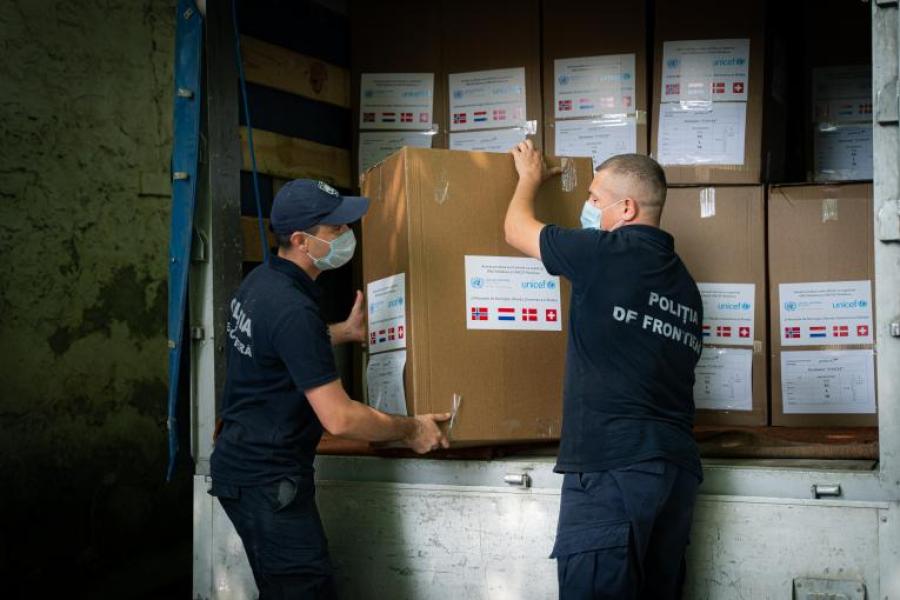Quality personal protective equipment should be available to all frontline workers
29 July 2020
UNICEF delivered a lot of personal protective equipment and two thermography scanners with a total value of 363,000 MDL to the General Inspectorate of Border Police.

UNICEF delivered a lot of personal protective equipment for the General Inspectorate of Border Police today. The assistance includes 1,000 disposable non-woven protective gowns and 2,000 personal protective suits made from breathable, water-resistant material, comfortable and safe for the users, as well as two thermography scanners, which will help the border police workers to accurately measure the body temperature, while respecting the social distance of 1-2 meters and avoiding direct contact. Currently, more than 35,000 people are crossing the border of the Republic of Moldova every week.
The support is provided as a part of the UN COVID-19 Response and Recovery Multi-Partner Trust Fund, implemented by UNICEF, UN Women and IOM. The fund is financed by the Governments of Norway, Denmark, the Netherlands, and Switzerland in the amount of one million dollars, out of which UNICEF in Moldova implements USD 750,000.
”Protecting all frontline workers is important as they are most vulnerable to health risks. We cannot afford to overlook workers whom we may not see on a daily basis, this applies now as well as after the current COVID-19 outbreak, said Desiree Jongsma, UNICEF Country Representative in Moldova. Quality personal protective equipment should be available to all front-line workers, including in non-health facilities,” added Desiree Jongsma.
Border Police workers provide such essential services, interacting daily with thousands of people crossing the Moldova’s borders, and are exposed to a great risk of getting infected with COVID-19.
”This assistance will strengthen the capacities of the Border Police workers in proper management of state border activities, but also in preventing the spread of COVID-19 pandemics,” said Dorina Rusu, Press Officer of the General Inspectorate of Border Police.
In the following months, UNICEF will continue to provide additional personal protective equipment for the front-line workers in health and non-health entities in order to ensure the efficient and safe provision of public services during the COVID-19 crisis.
As a global leader in the procurement of products and services for children, UNICEF works with suppliers and the private sector at large to secure affordable prices and the best value for money.
Back in April, despite the restrictions on international traffic in connection with the COVID-19 pandemic, an UNICEF shipment of professional protective and medical equipment for health workers, weighing more than 700 kg, with a total value of USD 116 thousands, was delivered to the Government of Moldova to support its response to the COVID-19 virus outbreak.
So far this year, UNICEF globally has shipped key personal protective equipment (PPE) supplies to over 100 countries to support their response to the pandemic, including 7.5 million surgical masks, 2.8 million N95 respirators, nearly 10 million gloves, over 830,000 gowns, and nearly 600,000 face shields. UNICEF also shipped over 550,000 diagnostic tests, with an additional 912,000 planned to be delivered through August and is sending over 16,000 oxygen concentrators to 90 low- and middle-income countries.
About the UN COVID-19 Response and Recovery Multi-Partner Trust Fund
The UN COVID-19 Response and Recovery Multi-Partner Trust Fund supports development, effectiveness and UN coherence through the efficient, accountable and transparent design and administration of innovative pooled financing instruments. The fund is currently supported by the Governments of Norway, Denmark, the Netherlands, and Switzerland.For more information on the UN COVID-19 Response and Recovery Multi-Partner Trust Fund visit http://mptf.undp.org/factsheet/fund/COV00.
About UN support in COVID-19 response
The United Nations in Moldova has been supporting the Government of Moldova and Ministry of Health, Labor and Social Protection as well as other institutions from non-health areas involved in the response in three main areas: health system preparedness, technical support and capacity building and risk information and communication on COVID-19 under the guidance of WHO Moldova.


